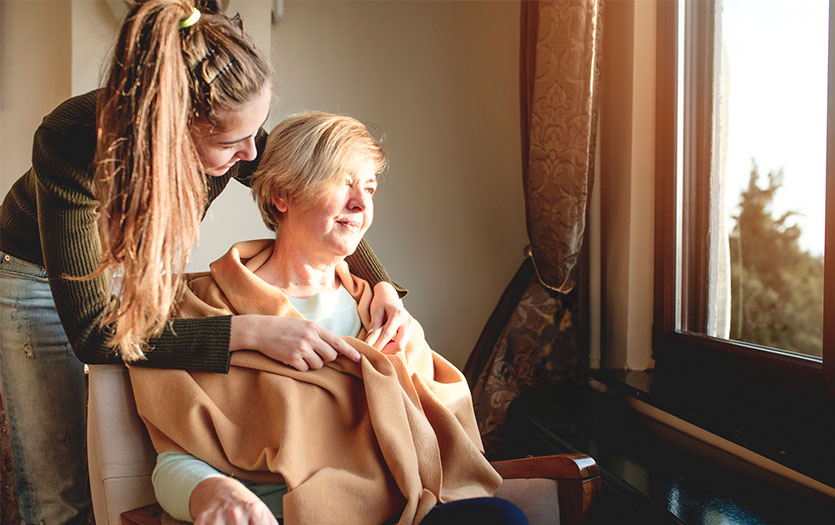
This post was written by Jeffrey Brown, MD, Medical Director, Parkview Hospice and Palliative Medicine.
The decision to elect Hospice Care instead of traditional, life-prolonging treatments is rarely easy. Sometimes it reflects a difficult, if necessary, change in focus after an extended struggle with chronic illness. For others, it may be borne from an acute (and perhaps unexpected) change in health due to a new diagnosis, trauma or medical event. Regardless of the reason, this new care model, and its primary focus of maximizing quality of life, may come with some surprising or unexpected changes.
The hospice team
After initiating hospice care, the first few days will include meeting your new care team. Our core staff members–a nurse, social worker and chaplain—will each want to arrange an initial visit with you. Sometimes these visits can be coordinated together if schedules allow. You may also wish for additional services, such as a home health aide, massage and/or music therapy and volunteer assistance. It might all seem a bit overwhelming at first but, rest assured, things will fall into a slower routine as your team establishes a care plan that is right for you. Additionally, you can always put your own limits on the number of visits and visitors you are comfortable with.
A note on chaplain support: some people may feel that, as they already have their own pastor or minister, a hospice chaplain simply isn’t needed. Similarly, others who believe since they don’t share the same belief system as a chaplain (or who don’t subscribe to any belief system) cannot benefit from hospice spiritual support. I believe it is best to think of a hospice chaplain as an additional “specialist” who is skilled in helping navigate through the unique spiritual stress and angst that those faced with a terminal illness commonly experience. This support can be quite helpful to caregivers/families in addition to patients and is not limited to a specific denomination or belief system. Chaplains are a resource I encourage every hospice patient to take advantage of.
You might also see a change in who provides your medical care. For most hospice patients, care is guided by a physician or nurse practitioner who specializes in hospice and palliative medicine. These individuals have extensive experience in managing symptoms in an effective and safe manner and may be more accessible to hospice staff on weekends or after hours should urgent needs arise. Sometimes your primary or specialty physician may also fulfill this role for you should you desire, although many providers may still prefer to have a hospice specialist assume your care if they are less confident in their own experience or expertise in symptom management. It is important to understand that your entire healthcare team, both past and present, is wishing for you to receive the best possible care going forward with the goal that you may live each coming day as fully and comfortably as possible.
Medications
You can also expect to see some changes in your medication regimen when starting hospice care. This may be surprising when you may have been told in the past that you will need to take a certain medication (or medications) “for the rest of your life.” In reality, many drugs used to treat chronic illnesses may lose their intended benefit as our bodies weaken through advanced age and illness. In these cases, the burden or risk of a given medication may far outweigh any benefit that may remain. This is particularly true of treatments for high blood pressure or diabetes where pursuing “normal” numbers is a reasonable goal earlier in life given the intent of preventing vascular complications that occur over a long period of time. In a hospice population, however, this intensive pursuit of “normal” may exacerbate symptoms of fatigue, weakness, dizziness, and malaise - which can have a negative impact your quality of life.
Your hospice physician will carefully examine your current medications and attempt to limit these only to those that will be most helpful and least likely to be harmful. We will want to focus on medications that directly contribute to your comfort and quality of life, as well as those where discontinuation might lead to decompensation and an increase in symptoms or discomfort. Drugs that don’t fall into one of those two categories may no longer be necessary.
We know that, as we are more affected by advance age and illness, we are more likely to experience adverse drug interactions and undesirable side effects, some of which may even be dangerous (such as a drop in blood pressure or blood sugar). We often see regimens where a patient is required to take upwards from twenty, thirty and even more doses of medications each day. Limiting both unnecessary prescription medications, as well as dietary supplements (vitamins, herbal or “natural” remedies), will often provide a significant, tangible improvement to a hospice patient’s quality of life.
As expected, when our focus changes to comfort-oriented care, you may likely see some new medications ordered to help manage undesirable symptoms, including pain, anxiety, nausea or shortness of breath, among others. If prescribed an opioid pain medication, you will also likely be prescribed medication to avoid constipation (a very common opioid side effect). Your care team will provide education and instruction about when these new medications may be helpful and can address any concerns or questions that may arise. Ultimately, we simply wish to provide you with all the tools and information necessary to help you live your best life possible while under hospice care.
Complications in care
Once you’re receiving hospice care, what do you do when problems arise? While earlier in a patient’s disease process, calling 911 and/or going to the emergency department might be an appropriate course of action. Once a patient has decided to forego aggressive, life-prolonging treatments in favor of a focus on palliation, your team will endeavor to manage these crises at home via medication changes and/or increased staff presence and support. You always have access to a hospice nurse 24/7, and visits can be made to your home at any hour to address new problems or distressing symptoms.
In some rare instances (and depending on an individual’s goals of care), evaluation in the emergency department may even be recommended, such as a fall where fractures or injuries are suspected that would require specialist intervention. Sometimes, despite our best efforts, symptoms are unable to be adequately managed through medications at home, and options for short-term, intensive interventions to address uncontrolled symptoms are available; inpatient hospice care (in a hospice home or hospital unit) or “continuous care” in the home setting can allow for use of injectable medications and/or infusions to help provide comfort in the event of such a crisis.
Respite care
What if the issue lies with the caregiver, rather than the patient? Sometimes a caregiver has an injury or illness that requires hospitalization, is needed out of town or is simply burnt out and needs a break for a few days. When these situations arise, respite stays of up to five days are available and included as a part of the hospice benefit (to be provided in a location where 24-hour care is available; typically, in an extended care facility or hospice inpatient facility, but at times may also be provided in a hospital setting).
It is also important to remember that the choice to pursue hospice in favor of life-prolonging treatments is just that – a choice. If, at some point during your hospice journey, you wish to change focus back to more traditional, life-prolonging care, you have the right to revoke your hospice benefit at any time. Should your goals once again align with hospice care in the future, readmission to hospice may be possible at that time.
In summary, the decision to pursue hospice and comfort-oriented care over aggressive treatments intended to prolong life may be the most significant choice you ever make regarding your healthcare. It may have come easily, or with a great amount of debate and consternation. It may have been a personal choice consistent with long-standing goals of care, or it may have felt like the only remaining option as possibilities for effective life-prolonging treatments were exhausted. Regardless of how you may have arrived at this conclusion, your hospice team is committed to help you achieve your desired quality of life moving forward. While we may not be in control of how much time we have remaining in our worldly journey, our unwavering desire will remain to do whatever is possible to make each coming day a good one.
Learn more about Parkview’s Hospice Care offerings by visiting us here.



